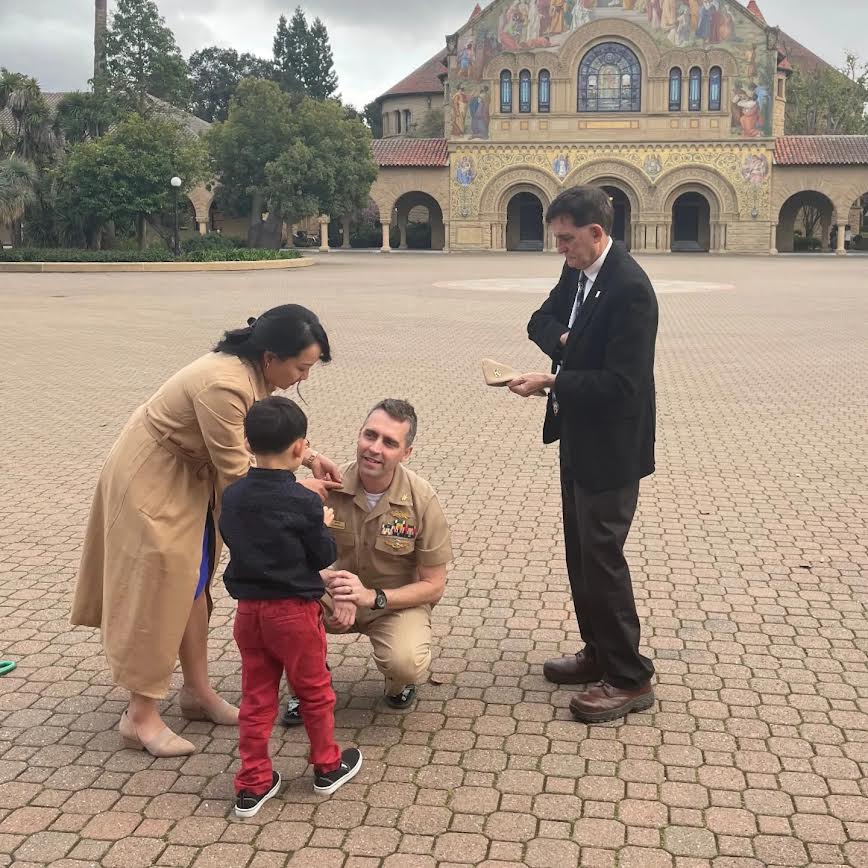Salisbury’s Lt. Cmdr. Garrigues to head Navy construction in Australia after Stanford graduation
Published 12:10 am Sunday, January 5, 2025

- From left to right, Amy Hu, Chase Garrigues, Lt. Cmdr. Bradford Garrigues Jr. and Brad Garrigues Sr, at Bradford Garrigues Jr.'s promotion ceremony.
SALISBURY — Graduating Salisbury High School, to fighting in the Second Battle of Fallujah as a Marine, to graduating from Rowan-Cabarrus Community College and the University of North Carolina at Charlotte, to joining the Navy Civil Engineer Corps, to getting a master’s degree from Stanford, to Australia and then back home.
It’s far from the typical career and educational path, but it’s the one Lt. Commander Bradford Garrigues Jr, a Salisbury native, has taken and plans to finish.
Garrigues graduated in December from Stanford University with a master’s in civil and environmental engineering with a specialization in sustainable design and construction. Now, he will be moving on to Darwin, Australia, where he will be named the resident officer in charge of constructions for all Navy operations on the continent.
“We’ll be in Darwin for three years and we’ll build new runways, parking aprons and hangars for the USMC and Air Force on the Royal Australian Air Force base there. The job title is the resident officer in charge of construction. My boss is in Pearl Harbor, so I’ll be the one meeting with contractors, doing the inspections, controlling their payments and being the representative for all of Australia. We have a site in Darwin, in Catherine and maybe future projects they could try to award,” said Garrigues.
The CEC sends all of its officers to get master’s degrees at civilian institutions throughout the nation, but only a select few are sent to the three offered “prestige” universities, of Stanford, Carnegie Mellon and MIT.
Garrigues spoke highly about his time at the school, although he did say that it was a little different to be a 43-year-old man in classes with 18- and 19-year-old “whiz kids.”
“They want to change the world, and of course make a lot of money. I got to go see (NVIDIA CEO and founder) Jensen Huang, (Tesla co-founder) Marc Tarpenning speak to a class of 30 people. Everyone cares a lot about the school and wants to make a big difference,” he said.
However, Garrigues said that it was much tougher on his family, as his wife Amy Hu was forced to continue her optometry practice through telehealth and his son Chase, who is in first grade, had to move across the country with him. His two older sons, Cole and Thomas, stayed in South Carolina and flew out to see him.
“It was a very tough year for all of us, being so far from home, my schedule changing every quarter. It was very challenging for them to adjust, for just 10 weeks this is our schedule. It took a lot of sacrifice on their part, it was harder for my family than me. I was getting paid full time, I just had to get good grades. They had to adjust more than me,” said Garrigues.
Garrigues started that career path back in 1999, when he graduated from Salisbury High School. In 2001, he would join the Marines and served as a combat engineer, which would culminate in him and his brother Jonathan Garrigues, also a Marine, being deployed to Iraq and fighting in Fallujah. After he finished his deployment in 2005, he was left wondering how best he could use the skills he learned as a combat engineer back in the United States.
Because so much of his role had involved the usage of explosives, he gravitated towards engineering. He said a friend’s father was a mechanical engineer, and when he began to look into what civil engineering entails, he realized that the versatility would give him plenty of opportunities.
“I had a feeling that I wanted to do something tangible, so I thought explosives and thought civil. I didn’t realize how wide a field civil is, you can do clean water, you can build railroads. I could graduate with a civil degree and go work at Norfolk Southern like my grandfather did, he worked at Spencer Shops,” said Garrigues.
With the Post-9/11 G.I. Bill, Garrigues went to work on his education, first earning his associate’s degree from RCCC before graduating from UNCC with a bachelor’s degree in civil engineering.
He became a licensed engineer in North Carolina after joining the Navy Civil Engineer Corps, with which he has been stationed in multiple places, including six months recently in Micronesia. The CEC is responsible for managing the entirety of the Navy’s shore facilities.
“We were there to upgrade a bathroom in a high school which was the high point for tsunamis when I was with the Seabees. We were in Micronesia during the pandemic and did a lot of state-funded projects there in case COVID arrived there. We helped turn an elementary school into a quarantine site, things like that to prepare for COVID,” said Garrigues.
After he finishes his service in six to 10 years, Garrigues says that he and his wife hope to return to Salisbury. In 2018, they purchased and restored the Woodson-Reamer House in downtown Salisbury, which he said they hope to live in once they return home.




